
‘Boy moms’ receive backlash for teaching sons how to cook - but for the wrong reason
Many people are calling out mothers of sons - also known as “boy moms” - for the reason why they’re teaching their sons how to cook, as some people call it a “red flag”. The TikTok trend first began when user Laura Elizabeth Graham shared a video of herself cooking in the kitchen with her young son, as she wrote over the clip: “Making sure my son can cook so he’s not impressed by your daughter’s [Stouffer’s] lasagna.” She continued to write in the video’s caption that her son would need a “home-cooked meal” from his future wife. Meanwhile, fellow “boy moms” also hopped on the trend, as one shared a similar video how she was teaching her son cooking skills so “he’s not impressed by your frozen pizza daughter”. The videos have since sparked a debate, as many users replied that they were teaching their sons to cook “because it’s a necessary life skill for independence.” “Teaching my son to cook because it’s a basic necessity,” one person commented under Graham’s video. Another person proclaimed they were “team daughter-in-law,” while one viewer added that the trend was “screaming red flags”. In response to the TikTok trend, some mothers took the opportunity to point out that showing young boys how to cook - just so that he’s not “impressed” by someone else’s cuisine - only teaches him to expect a higher level of household labour from his future partner. In fact, TikTok user Payal Desai posted a series of videos showing the ways in which she was teaching her sons how to take care of themselves - emotionally and physically - as they grow older. In one video, Desai showed her sons how to clean the dishes and explained why she does it: “So your daughter doesn’t have to deal with a man who was catered to his whole life.” @lauraelizabethgraham He’s gonna need a home cooked meal Felicia ? #boymom #boymomlife #boymomsoftiktok #mamasboy #mommasboy #mamasboys #relatablemom #motherinlaw #motherinlawproblems #momsoftiktok IB: @brontevictoria.capowski ♬ original sound - Laura Elizabeth Graham Many mothers of young boys also joined in, showing the ways in which they were empowering their sons to be more self-sufficient and responsible. Meanwhile, psychologist and mother Amber Wardell reacted to the TikTok trend, saying in a video: “I’m teaching my son to cook so that he will show up for his future wife as though she’s his partner and not his servant.” The ongoing trend to categorise parents as a “boy mom” or “girl dad” reportedly perpetuates gender stereotypes. “The gendering process then continues through quite literally every aspect of that child’s life: the pink or blue newborn hospital beanie, the princess or football player clothing gifted at the baby shower, the jungle or fairyland nursery room decor, and of course, the toy trucks or baby dolls,” Dr Jessica N Pabón-Colón - an associate professor of women’s, gender, and sexuality studies at SUNY New Paltz - explained to Refinery29 in 2021. @payalforstyle No dust here. #dustyson #dustydaughter #trend #boymom ♬ original sound - Bryan Pabón-Colón emphasised that juxtaposing opposite genders, in hashtags like #BoyMom, also reinforces supposed gender differences. Speaking to the outlet, she explained that both the #GirlDad and #BoyMom trend “announces the ‘feminine’ mother’s ability to parent a child whose ‘masculine’ gender is different from hers,” and ultimately suggests that parents of the opposite gender have to try harder to relate to their girls and boys. @sensible_amber This is how we create snobby, entitled men who treat their wives like the help and constantly compare them to mommy dearest. Let’s teach our boys to be self-sufficient, nurturing, compassionate, and supportive. Let’s teach them that their wives do not exist to be their mommies. Most importantly, let’s teach our sons that it is HEALTHY and NORMAL for them to one day leave us and become more attached to their wives than they are to us, and that this is what we WANT for them. Otherwise, we’ll all end up with our boys living with us forever — not because they love us but because no women will have them. They’ll be divorced, lonely and miserable, and we’ll still be cooking their meals. Is this really what we want for our sons? #motherhood #momlife #motherhoodunplugged #motherhoodunited #parenting #boymom #biymomculture #toxicboymomculture ♬ original sound - Amber Although seemingly innocuous, she suggested that this mentality does more harm than good. While the hashtags themselves aren’t harmful, Pabón-Colón emphasised that their stereotypes are limiting. She argued that “the label ‘boy’ cannot possibly contain [a child’s] personality traits,” and that there’s more to any one person than their sex or gender. “Having a vulva does not explain a child’s desire to have a tea party with their dad any more than having a penis explains a child’s desire to climb a tree with their mom,” Pabón-Colón said. The Independent has contacted Laura Elizabeth Graham for comment. Read More Homeowner sparks criticism after telling contractor not to use her bathroom Bride tries on mother’s wedding dress 30 years after parents’ wedding Mom documents at-home abortion to destigmatise abortion pills Schoolboy almost dies from swallowing magnets for TikTok challenge Woman shares honest review of New York City apartment TikTok mom slammed after making 5-year-old son run in 104 degree heat
2023-08-26 04:29

Chris Pratt’s daughters give him a glittery makeover
Chris Pratt has shown off his sparkly new look after his daughters gave him a makeover. The Guardians of the Galaxy star, 44, shares his daughters Eloise Christina, 15 months, and Lyla Maria, three, with his wife Kathrine Schwarzenegger. He also shares his 11-year-old son, Jack, with ex-wife Anna Farris, 46. In an amusing Instagram caption, Pratt wrote: “All I have to say... Jack would never do this to me.” Pratt gave fans a glimpse of two different looks. The first one showed his forehead bedazzled with teal, purple, and silver gems. He had pearl-like gems dotting his face, as well as a teal manicure, in the other. TheTomorrow War actor opened up on Late Night with Seth Meyers about his experience going from raising one son to two daughters. Pratt noted that his daughters’ penchant for all things glitter is one of many differences that he loves and appreciates. “I love it. It’s fantastic,” he gushed to host Seth Meyers. “You know, you hear that maybe the experience is different and it really is, in my experience." “My daughter Lyla is so girly. I picked her up yesterday and she said, ‘Oh Daddy, that’s a cute outfit. Look, you have little cute pockets,” Pratt added, laughing: “That’s not something Jack ever said to me.” While Eloise and Lyla may be mini fashionistas, Jack has taken a liking to America’s favorite pastime: baseball. The Parks and Recreation alum took his son to watch a Los Angeles Dodgers baseball game in late July and posted pictures of the fun father-son day on Instagram. In the photos, Pratt and his son posed with a jersey that had their last names printed on the back. “What a day! Jack and I got to hit the mound together, eat our bodyweight in Dodger Dogs and delivered the game opening announcement!” the actor captioned his post. He also mentioned his gratitude to the baseball team for hosting the fun outing: “Thank you @claytonkershaw for asking me to throw yesterday’s pitch for faith and family day, what an honour! Let’s go Dodgers!” Watching his father play baseball isn’t the only time that Jack has supported his dad. Pratt previously said that his son was “freaked out” that his dad was voicing Mario in The Super Mario Bros Movie, telling People: “He saw it already and he’s thrilled. He loves it. He took all his friends and he really freaked out.” The actor also noted that although his daughters were “a little too young” to watch the movie, he hoped that when they eventually see it “they’ll think their dad is cool”. Read More Maria Shriver reveals how she avoids conflict as a mother-in-law: ‘I zip my mouth’ Chris Pratt says every dad ‘secretly fantasizes about what they’d do if someone ever f***** with their kids’ This is how stress affects different parts of the body 4 hacks to get teens off the sofa and get active – as study warns of heart damage How to protect your kids and yourself from back-to-school colds
2023-08-25 21:45
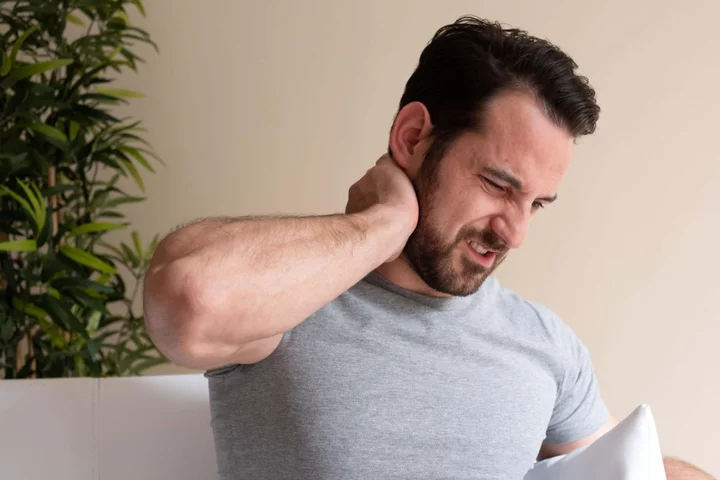
This is how stress affects different parts of the body
The increased focus on mental health in the last few years has seen more and more people turning to things like mindfulness, meditation and talking therapies to cope with stress. While these techniques can be very effective, it’s important to remember that stress isn’t ‘all in your head’ – it can have a serious physical impact as well. “Stress is how you feel and respond when life puts you under a lot of pressure,” says Dr Luke Powles, associate clinical director at Bupa Health Clinics. “A certain amount of stress can be positive, as it can help you prepare for challenges and respond to them,” Powles adds. “But too much stress, especially over a long period of time, can cause both mental and physical problems.” That’s why it’s vital to look at the sources of stress in your life and be aware of both the short and long-term symptoms. Here’s how stress can affect different parts of the body… Heart and lungs A sudden surge of stress can make you feel like you’ve just run up several flights of stairs. “Immediately, you’re going to get an increase in your heart rate, with that almost panic attack or anxiety-like feeling,” says Dr Alka Patel, aka the Health Hacktivation Doctor. “Your breathing rate is going to speed up as well, because you’re trying to oxygenate your blood.” That’s also why you might get sweaty palms or pits: “You get vasodilatation of your blood vessels – you’re basically trying to increase blood flow to your body, so sweating is a very immediate phenomenon for most people.” Stressful situations can raise your blood pressure temporarily too, Powell says: “If you’re stressed over a long time, you could possibly develop long-term high blood pressure.” The link between stress and heart disease is mitigated by other factors. “Stress may not directly cause coronary heart disease, such as a heart attack or stroke and cholesterol,” says Powell. “But if you smoke, drink, or eat more to cope with stress, you increase your risk of these. Stress may also increase the risk of type 2 diabetes.” Doctors also warn about heart rate variability (HRV), meaning the variation in the pauses between heartbeats. “You want a high HRV because you want to be adaptable,” Patel explains. “When you’re under chronic stress your HRV starts to drop, and that tells you that you’re not resilient in the face of stress.” Stomach and gut Feeling too anxious to eat? Or craving carbs when you’re under pressure? “You’re releasing this surge of cortisol, the stress hormone, very quickly, which is then trying to get as much sugar and fuel on board,” Patel explains. “A lot of people will then either notice the hunger response: ‘I’ve got to eat lunch to manage my stress’. Or you notice the dip, which is: ‘I don’t want to eat, I can’t eat anything else’.” You might experience digestive issues as well, she continues: “With an immediate stress reaction, everything else in your body has to stop. This means you can start to get those symptoms of diarrhoea, upset stomach, that kind of thing, because all of those digestive processes have to have to halt in order to manage your stress.” There are also some links between chronic stress and certain illnesses, including digestive complaints. “If you have a pre-existing health condition, stress could make it worse, or flare up,” says Powell. “Examples of conditions that can be aggravated by stress include irritable bowel syndrome, eczema, asthma and psoriasis.” Muscles A surge of stress can cause muscle spasms called fasciculation and tension in the cervical muscles of the neck, which might lead to a headache. “People don’t necessarily associate headaches with muscles, but you can get spasms in your upper neck muscles and shoulders,” Patel says. “You feel the tension in the muscles going over your scalp – and that’s why we call these tension headaches.” Teeth and mouth Stress can also harm your oral health, which should be dealt with by a dentist. “Teeth grinding (bruxism) is often linked to stress, but lots of people aren’t aware they have the condition because it happens in their sleep,” says Powell. “Symptoms include headaches, earache, stiffness and pain in the jaw or mouth; teeth which are breaking or look worn down; and facial swelling.” Inflammageing A hot topic among longevity specialists in recent years, ‘inflammageing’ means chronic inflammation that has a damaging effect and is caused by a variety of diet and lifestyle factors. “Stress accelerates ageing, and then there’s a whole cascade of stuff that goes on as a result of that,” says Patel. “[It affects] your immune response, the communication between your cells, muscle function and your bones.”
2023-08-25 21:20
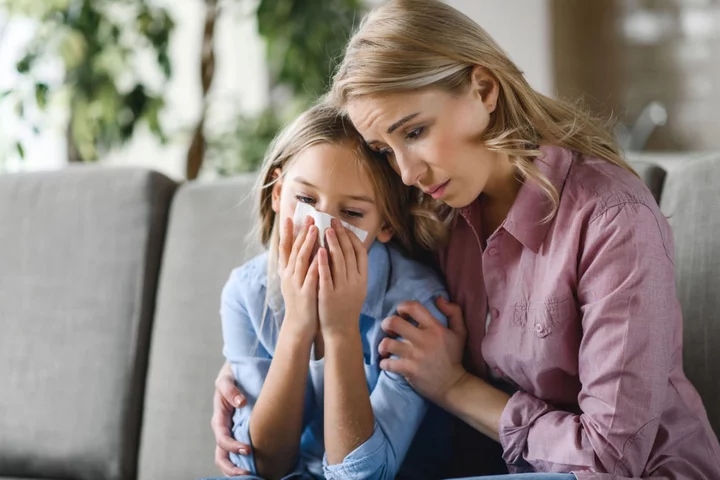
How to protect your kids and yourself from back-to-school colds
While your child may be excited about returning to school this September, there’s also a little anxiety about the one thing that can put a spanner in the works: a cold. As Dr Dave Nichols, of MyHealthChecked, an at-home wellness testing company, puts it: “The return to school following the summer holidays often coincides with a rise in a number of respiratory illnesses, including the common cold.” Common symptoms include a cough, sore throat, nasal irritation, nasal discharge (rhinorrhoea), a fever or generalised malaise, explains Nichols. “While the common cold can affect all population groups, the National Institute for Health and Care Excellence report this to be far higher amongst children, who experience an average of five to eight colds per year.” Nichols continues: “Adults who have regular contact with children are also seen to have colds more frequently.” He says children are especially important in the transmission, acting as reservoirs for the infection as they have fewer antibodies and a more immature immune system, making them more susceptible to the common cold. “Direct contact with the skin or hand contact with an infected object are key ways the virus is transmitted,” notes Nichols. “Which explains why numbers seen amongst children are higher, as they are more likely to have close contact with each other in nursery and school.” While there is no cure for the common cold, he says prevention remains crucial in order to protect ourselves from illness. Here are some top tips to reduce the chances of catching a cold… Adopt good hygiene measures Basic good hygiene measures are an important way of reducing the transmission of viruses, says Nichols. Wash hands frequently with warm soap and water if you (or the kids) have symptoms, or have come into close contact with someone who has symptoms. He says to avoid sharing items within households, such as towels, can also help. Get into a physical exercise routine Ensuring regular physical exercise is important because it has been shown to reduce the chances of people developing viral illnesses such as the common cold, advises Nichols. “Exercise plays an important role in boosting immunity by increasing the circulation of some important immune cells, which fight against infection,” says Nichols. “It also plays a key role in helping to reduce stress and the release of stress-related hormones within the body, which has an important impact.” Eat healthy foods to maximise your wellbeing “Eating well will help support a good functioning immune system,” says Dr Emeka Okorocha, medical doctor and TV personality. “The body needs a range of nutrients and vitamins to stay strong and healthy, and prevent the development of disease.” He highlights the following vitamins… “Vitamin A, which is converted from beta carotene found in vegetables such as sweet potatoes and beetroots, is very good for helping support the mucosal lining in your nose and lungs – and helps defend against infection. “Vitamin C has always been considered a good preventative vitamin from catching colds, this can be found naturally in fruits like strawberries, blueberries, blackberries and raspberries – and in leafy vegetables like spinach as well as broccoli, peppers and peas. “Vitamin D that many of us get from natural sunlight is also ideal for overall health – and studies have shown that people lacking in vitamin D are more likely to succumb to infection.” In winter months, when there are lower levels of natural sunlight, he says you can obtain vitamin D from foods such as salmon, mackerel, eggs, and mushrooms. Berries are very beneficial Okorocha continues: “I love fresh berries – strawberries, raspberries and blueberries, for example, are high in antioxidants and contain lots of vitamin C, which helps our bodies to produce antibodies that keep us from getting sick. “Berries are also high in flavonoids which help protect cells in our immune system by promoting activation and secretory processes within cells.” He says studies have indicated that regularly eating fruits such as blueberries may decrease your likelihood of catching a cold. Get adequate rest and sleep Ensuring you’re getting adequate amounts of rest and sleep is crucial in helping to reduce your risk of becoming unwell, urges Nichols. “A healthy adult needs between seven to nine hours of sleep per night, with children requiring longer,” says Nichols. “Sleep quality has been shown to be an important predictor of immunity, with those regularly sleeping under the recommended amounts more likely to develop a cold. “Improving your sleeping pattern is therefore an important way to reduce the chances of becoming unwell.” Read More Former royal chef explains why Prince William and Kate’s children don’t eat with them ‘You think it’s going to be a money making machine’: How modern life killed the hobby People defend bride after father-in-law explains why he left wedding early 4 hacks to get teens off the sofa and get active – as study warns of heart damage Elle King opens up about her ‘deep depression’ amid two-year postpartum journey BBC Radio 2’s Tony Blackburn reveals he had sepsis and pneumonia in health update
2023-08-25 15:46

Elle King opens up about her ‘deep depression’ during pregnancy and two-year postpartum journey
Elle King has spoken out about suffering with a “deep depression” during and after her pregnancy. The singer, 34, took to Instagram on Wednesday (23 August) to speak candidly about her mental health, two years after welcoming her son, Lucky, who she shares with tattoo artist Daniel Tooker. Her post included different videos of herself, in which she was working out, cleaning her skin, or singing on a stage. In the caption, she went on to reflect on her weight loss journey throughout the last two years, and acknowledged that she still plans to continue her workout routine. “I am making this post to share my journey from 284 lbs at 5‘3 from pregnancy 2021 - now 2023,” she wrote. “It doesn’t happen overnight. It didn’t even happen in a year for me. In fact, it’s an ongoing still working towards ever changing goals kinda thing.” King continued her post by opening up about her mental health struggles - both during and after her pregnancy - which included postpartum depression. “I fell into a very deep depression during my pregnancy. I also didn’t even realise how intense postpartum depression is and was until I very slowly began to crawl out,” she wrote. “I felt trapped in my body.” While symptoms of postpartum depression can vary, some of them can include difficulty bonding with your baby, withdrawing from loved ones, and a loss of appetite, according to the Mayo Clinic. In her Instagram caption, King went on to explain that amid her symptoms of postpartum depression, she started working out more. She then acknowledged that she’s now seen her body get “stronger” over time. “Metabolic workouts. Light cardio to warm up my body, my lungs, my voice, and my spirit. I am a creature of habit, so I changed my f***ing habits,” she wrote. “Every few weeks I feel my body getting stronger. I add more workouts.” The “Ex’s & Oh’s” singer expressed that while she wanted to lose weight after welcoming her baby, there was “so much more” insentive since her brain “functions better on the days” that she moves her body. She also described how she’s now embraced the way that her body looks. “Some days I count stretch marks. Some days I hug myself and say thank you to my body. Today is a kind day. I’ve been tiny, I’ve been huge, BUT RIGHT NOW I’M HEALTHY,” she continued. “I can’t believe that I even have to say this, but no, I am not on any weight loss medication.” She added that she’s had a few health conditions over the years, including being pre-diabetic and suffering with Polycystic ovary syndrome (PCOS). PCOS is a condition that consists of “problems with hormones that happens during the reproductive years,” as noted by the Mayo Clinic. Symptoms can range from irregular periods to polycystic ovaries, which are “follicles containing immature eggs may develop around the edge of the ovary”. King continued her message by sharing that her “diabetic grandfather died” when she was 10-years-old, after she “watched him prick his finger and give himself shots”. She concluded by showing her support for her followers, and by sharing the goal of her workout routine, writing: “I do not judge anyone who is trying to live a healthier life. I can only share MY OWN JOURNEY! I just hope to live a long, wonderful, healthy life where I can drink a lot, eat fish, laugh as much as I can, and die happy.” This isn’t the first time that King has been open about some of the health challenges she has faced. When announcing her pregnancy in 2021, during an interview with People, she revealed that she’s had struggles with infertility, explaining that she previously suffered two pregnancy losses due to her PCOS. “It’s such a major thing that so many people go through, but it’s so secretive - like you have to go through it alone,” she said about the pregnancy loss. “Nobody talks about it. It’s like you’re supposed to feel shame; like you’re not supposed to tell people before 12 weeks, because if you lose it, it’s going to be embarrassing for you and you don’t want other people to get their hopes up. Like, holy s***.” Read More New mother filmed doing laundry seven days after giving birth sparks debate ‘It can hit everyone’: Postnatal depression is surging, and it’s still misunderstood Olivia Munn opens up about her postpartum body 20 months after giving birth Sienna Miller pregnant with her second child Serena Williams celebrates second pregnancy with ‘pre-push party’ Lisa Snowdon opens up about ‘tortured thoughts’ after abortion: ‘Was that my chance?’
2023-08-24 23:59

BBC Radio 2’s Tony Blackburn reveals he had sepsis and pneumonia in health update
Tony Blackburn has revealed that he had life threatening sepsis and pneumonia after coming out of a two-month stay in hospital. The veteran BBC Radio DJ had pulled out of his Sound Of the 60s UK Tour and accompanying radio show earlier this year after he was taken ill. At the time, Blackburn told his listeners he had a chest infection. Now that Blackburn has fully recovered and has been discharged from hospital, the DJ has revealed that he was actually suffering from sepsis, pneumonia and blood poisoning. “I was doing three a week at one time forgetting that I’m now a little bit older, so I ended up in hospital for two months with sepsis and pneumonia and blood poisoning,” he said on BBC Radio Scotland’s Afternoon Show on Wednesday (23 August). “And I didn’t realise how unwell I was until one day in the hospital my whole family were gathered around the bed. And I thought ‘this isn’t good’.” “A couple of weeks ago I went to see my specialist and he said ‘you are cured’, so that was a nice thing to hear.” After a three-month break, Blackburn has returned to his tour but will be doing one show per week rather than three per week. He said: “I haven’t been doing the [tour] show for about three months because I was told to rest a little bit. Now I’m back in form and we’re selling out.” “I love being with the band and it’s just loads of fun.” Blackburn returned to BBC Radio 2 after Johnnie Walker covered his Sounds of the 60s radio show during his illness and has since launched a new show on Sunday afternoons – Tony Blackburn’s Soul on Sunday on BBC Radio London. Back in May, Blackburn announced that he had been discharged from hospital and was looking forward to broadcasting again. “After three weeks in hospital I have just been discharged and am now at home to have some more treatment by having a daily injection for a few days from a hospital near me,” he said. “Thanks to everyone at the Wellington Hospital in London, doctors and nurses for looking after me. “After my treatment and a rest I look forward to getting back @BBCRadio2 and @BBCLOCALRADIO to doing what I love doing. Just want to thank all my friends for your lovely messages, you are all so kind to think about me xx,” he concluded. According to the NHS, sepsis is a life-threatening reaction to an infection when your immune system overreacts to an infection and starts to damage your body’s own tissues and organs. There are lots of symptoms of sepsis, and those symptoms can be similar to other conditions, including the flu or a chest infection. Read More Former royal chef explains why Prince William and Kate’s children don’t eat with them What we know about the leaked Pentagon documents on Ukraine Bride tries on mother’s wedding dress 30 years after parents’ wedding 4 hacks to get teens off the sofa and get active – as study warns of heart damage Selling Sunset’s Amanza Smith says she ‘almost died’ from spine infection Strictly’s Amy Dowden finding it ‘so hard’ as she shares hair loss update amid cancer
2023-08-24 23:19

Selling Sunset’s Amanza Smith says she ‘almost died’ after suffering from spine infection
Selling Sunset star Amanza Smith has shared an update after undergoing surgery to treat an infection that spread from her bloodstream to her spine. The interior designer, who works at the real estate company The Oppenheim Group, has revealed in a new interview how osteomyelitis, a painful bone infection, had affected her lower vertebrae. Smith, 46, discovered the infection after experiencing severe backache that lasted nearly a month. After she collapsed while at her Los Angeles home back in May, her friend encouraged her to visit the hospital. “I thought I had a backache, and I almost died,” Smith told People in the magazine’s latest issue. “The doctors and my friend saved my life.” Smith told the publication that she was given antibiotics to treat the infection but faced some complications. She underwent surgery on her lower spin to “clear the infection from the bones” but later found out that the osteomyelitis had affected another area at the front of her spine. “The risk was the antibiotics wouldn’t penetrate the bone, and my entire back could collapse,” she said. Smith had two surgeries to treat the osteomyelitis, which included having part of her spine replaced after it “deteriorated” as a result of the infection. The second operation lasted six hours, in which doctors inserted a titanium mesh cage in her back. She previously said: “Part of my spine has completely deteriorated due to the infection and I’ll be getting a new vertebrae and a couple of screws and rods in my spine to replace what has been eaten away from the bacteria.” In the new interview, she told People: “I am an iron woman, with rods and screws.” Smith returned home from hospital in early July, but her recovery period involves six months of antibiotics, physical therapy and “treading lightly on her feet”. “There are so many things I can’t do, because I can’t lift more than five pounds,” she told the publication. “Sometimes my purse is too heavy. You can’t speed up time, but I’m very anxious to be able to do the things that I love to do. I like to decorate. I like to rearrange. I want to be able to hang things, but I’m very limited right now.” Reflecting on her period in hospital, Smith said that she would never take her mobility “for granted” again. “When I can walk and jog again and do Pilates or ballet, I hope I stick to them because I plan on living to be 107,” she said. According to the NHS, osteomyelitis is a painful bone infection that usually goes away if treated early with antibiotics. However, it can cause serious long-term problems if not treated. Anyone can develop the infection, but a person may be more at risk if they have diabetes, a broken bone, a weakened immune system or recently had an infection or surgery. Smith joined Netflix’s hit reality show Selling Sunset in the second series in 2019. The show follows the drama surrounding employees at The Oppenheim Group, an elite real estate brokerage selling luxury properties in Los Angeles. Read More Queen’s service to inspire young writers in Commonwealth challenge High infidelity: why do people have affairs? Bride tries on mother’s wedding dress 30 years after parents’ wedding Revlon hits back at Selling Sunset star after she found makeup in her husband’s van Strictly’s Amy Dowden finding it ‘so hard’ as she shares hair loss update amid cancer How to help your teen with comparison culture on GCSE results day
2023-08-24 19:46
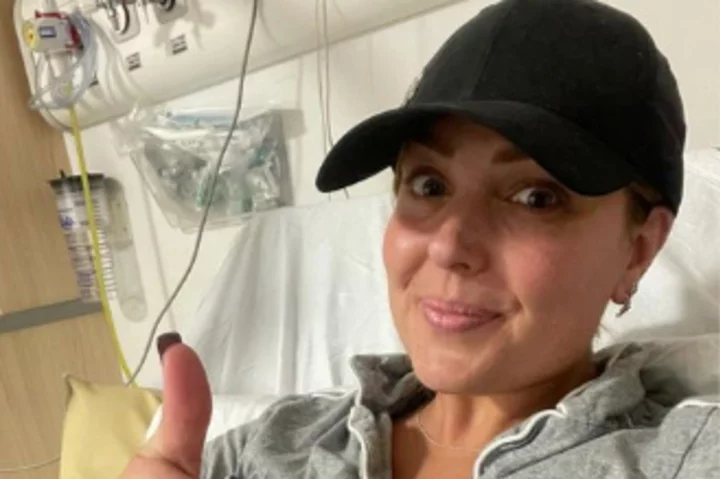
Strictly’s Amy Dowden finding it ‘so hard’ as she shares hair loss update during cancer treatment
Amy Dowden has shared an update on her hair loss after announcing she has breast cancer. The professional dancer, who is best known for appearing on BBC’s Strictly Come Dancing since 2017, revealed earlier this year that she had been diagnosed with stage three breast cancer. The dancer told fans that she underwent a single mastectomy after she was first diagnosed in May. Last month, however, she was told by doctors that she needed to undergo chemotherapy after further tumours were discovered following the surgery. Dowden, 33, has been keeping her fans updated as she navigates the treatment. In her latest update, shared on Wednesday (23 August), the dancer revealed she has been experiencing hair loss and was finding it “so hard”. Telling fans she had returned home after receiving treatment in the hospital, Dowden shared a picture as she held a clump of her hair, writing: “Welcome home,” with a series of broken heart emojis. She added: “So much everyday! So hard! One day at a time!” In a previous post, Dowden shared a video of her hair that had fallen out, writing: “The reality when I gentle comb,” with a broken heart emoji. Dowden told fans in a separate post that she had some blood clots but was “feeling good” following the treatment. “And I’m going home to my own bed,” she told fans. “Thanks again to the marvellous NHS! Got some blood clots but I’m feeling good other than a sore and swollen arm. Another hurdle along this journey. But again forever grateful to the nhs and my heroes around me.” Earlier this month, Dowden showed her followers the bespoke wig she had made to deal with her ongoing hair loss. Both Dowden and the owner of Be Unique Wigs by Charlotte shared a screenshot of their messages to Instagram, as Dowden thanked her for making the wig. Charlotte, the wigmaker, wrote: “I’ve been working on a wig for the beautiful @amy_dowden and just received this lovely message from her! “I love her,” wrote Dowden in the messages, asking if she could order another one. “Thank you so so so very much.” The wigmaker said in an Instagram post that it was an “honour” to make the wig for the Strictly professional. “I’m hoping it will give you some comfort in a difficult time, I’ve said many times on here... it’s not just hair!” she said. “Losing your hair can make such a difference to your confidence. It’s almost like losing part of your identity,” Charlotte added. After announcing her diagnosis earlier this year, Dowden told fans that she would not be able to dance in a competitive capacity on this year’s season of Strictly. “This year, it means I’m not going to be able to dance with a celebrity on Strictly, but I’m in such regular contact with the team – the BBC have just been utterly incredible,” she wrote in a post on social media last month. “The rest of the year looked very different to what was planned but hopefully I’ll enter 2024 cancer free and I’ll never take anything for granted and promise to live life to the full.” Dowden joined Strictly in 2017, and has competed in every series since, reaching the final in 2019 with kids’ TV presenter Karim Zeroual. Read More Former royal chef explains why Prince William and Kate’s children don’t eat with them Barbie drooling over Darcy? Why we still ardently love the BBC’s 1995 Pride & Prejudice Prince Harry to return to UK on eve of Queen’s death anniversary for charity event Amy Dowden shares pictures of new wig amid chemotherapy treatment for breast cancer How to help your teen with comparison culture on GCSE results day Women more severely affected by ME, study claims
2023-08-24 17:15

How to help your teen with comparison culture on GCSE results day
Whether your child’s GCSE results are high, low, or somewhere in between, one thing is inevitable – they’ll compare them with their friends’ grades. This comparison culture, which is far more pervasive because of social media, can leave teens feeling inadequate because their results are worse than their mates, or make their friends feel useless if roles are reversed. But although there’s no getting away from teenagers comparing their results both on and offline, what can parents do to try and limit the damage this it can cause? Former teacher Dr Julia Clements, principal educational psychologist at the children’s mental health charity Place2Be, says the comparison of results will undoubtedly impact some teenagers’ wellbeing. “Your teenager is bound to compare their results with their peers at the same school, but also through social media,” she acknowledges. “Although this comparison is inevitable, it may be harmful for your child’s wellbeing – especially if they’ve not done as well as expected. “Indeed, the term ‘compare and despair’ can be especially pertinent on days like today.” Sharon Davies, CEO of Young Enterprise, a charity which helps young people navigate the changing world of work, adds: “The pressure to measure up to their friends’ achievements can be overwhelming, leading to feelings of inadequacy or disappointment.” So how can parents help their teens? 1. Ask how they feel If your child is down on themselves and rating themselves negatively in comparison to their friends, they may reject any positives and praise parents provide, Clements warns. “It may be more useful, in the first instance, to ask them how they’re feeling, and to acknowledge and validate difficult feelings,” she advises. Such feelings may include disappointment, sadness, anger, shame, or feeling as if they’ve let themselves – and you – down. “If your child is feeling like this, it’s important to give them the message that you love them unconditionally and you’re proud and pleased to be their parent because of who they are – not because of the grades they achieve,” she stresses. 2. If they’ve done better than their friends… If your child has achieved good results, which may be better than some of their friends, then they’ll want to celebrate. But while celebrating is of course a great idea, Clements suggests: “You may want to talk with them about how to be sensitive and compassionate towards their friends who haven’t done so well.” 3. Help them turn a negative into a positive Consultant clinical psychologist Dr Nihara Krause specialises in teenage mental health and is working with the Talking Futures campaign to help parents engage their children in meaningful conversations about their futures. She says if a young person doesn’t get the grades they were hoping for, they may be highly critical of their performance in comparison to their peers. But she suggests parents show them how to turn their negative thinking around. “Parents should encourage their children to focus on recognising the approach they took to exams this time round and take steps to reflect on what they could do to achieve a better result in the future. Focus on what helps a young person gain their own personal best, no matter how their results compare with others.” 4. Don’t ask about their friend’s results or post about them Krause says parents should try to celebrate their child’s achievements for what they are and avoid asking about their friends’ results. “To avoid comparison, parents should also avoid sharing their child’s results on social media,” she says. 5. Don’t be too hard on yourself Clements points out that comparison culture may not just affect teenagers – if their results aren’t as good as expected, mums and dads might start comparing their own parenting during the revision and exam period with other parents whose kids have got better results. “As a parent or carer, you may also be drawn into unhelpful comparisons with others,” says Clements, “and you may question the amount of support you were able to provide your child in the run up to their exams. However, today is not a day for self-criticism or judgements – some self-compassion is important at this time.” 6. Reach out for support This might be the first results day many parents have gone through with their child, and while comparisons with other teens may well have been unhelpful, Davies points out that schools will have career advisers and teachers available who can offer support and advice. There are also online forums and blogs where those in similar situations share their experiences. She says: “No-one is expecting you to have all the answers – that’s why there’s support available.” Read More Charity boss speaks out over ‘traumatic’ encounter with royal aide Ukraine war’s heaviest fight rages in east - follow live Women more severely affected by ME, study claims 4 hacks to get teens off the sofa and get active – as study warns of heart damage Taking adult education classes may lower risk of dementia, study suggests
2023-08-24 13:51
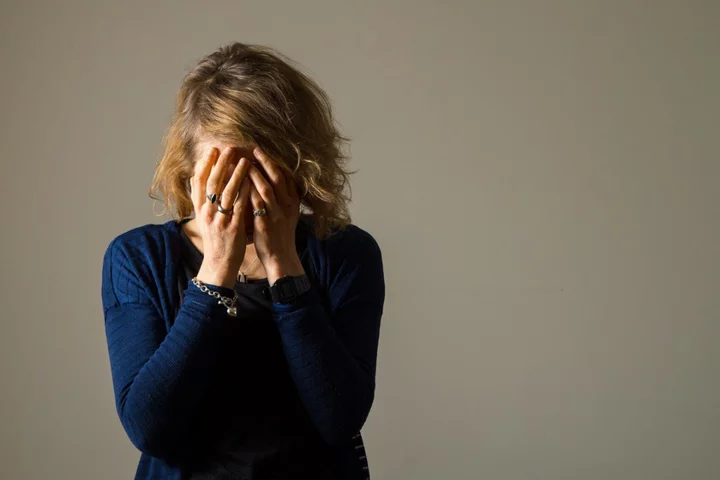
Women more severely affected by ME, study claims
Women with myalgic encephalomyelitis/chronic fatigue syndrome (ME/CFS) tend to have more symptoms and co-occurring conditions than men, according to the world’s largest study of the disease. The study, entitled DecodeME, reveals women who have the condition for more than 10 years are more likely to experience increasingly severe symptoms as they get older. ME/CFS is estimated to affect more than 250,000 people in the UK, of all ages and from all social and economic backgrounds. Its key feature, called post-exertional malaise, is a delayed dramatic worsening of symptoms following minor physical effort. Other symptoms include pain, brain fog and extreme energy limitation that does not improve with rest. Causes are unknown and there is currently no diagnostic test or cure. Experts from the University of Edinburgh analysed anonymous survey questionnaires from more than 17,000 people with ME/CFS. Two-thirds of women, and slightly more than half of men, reported at least one active co-occurring condition. Similarly, 39.2% of women and 28.6% of men reported at least one inactive co-occurring condition. We discovered that the disease is worse for women, in older people, and many years after their ME/CFS started Professor Chris Ponting of the University of Edinburgh A condition was considered active if the participant had experienced symptoms in the preceding six months. The most common active co-occurring condition was irritable bowel syndrome, with clinical depression, fibromyalgia, anaemia and hypothyroidism also featuring prominently. Women also reported, on average, more symptoms than men – 42 compared with 36. The most common of these symptoms were brain fog – a term commonly used to describe the cognitive impairment experienced by participants – unrefreshing sleep and muscle pain. These findings highlight the very serious impact ME/CFS has on women who are disproportionately affected Sonya Chowdhury, chief executive of Action for M.E Participants were also asked to define the severity of their illness from mild to very severe using definitions from the UK’s National Institute for Health and Care Excellence guidelines. Experts identified that being a woman and having ME/CFS for more than 10 years are risk factors for severe illness, with symptoms increasing in intensity as they age. Professor Chris Ponting, study lead from the MRC human genetics unit at the University of Edinburgh’s Institute of Genetics and Cancer, said: “ME/CFS is a devastating disease affecting a UK population the size of Derby. “We discovered that the disease is worse for women, in older people, and many years after their ME/CFS started. “Our hope is that DecodeME’s genetic results will shed light on why certain groups are more susceptible to ME/CFS than others.” Sonya Chowdhury, chief executive of Action for M.E. and chair of the management group of the study, said: “These findings highlight the very serious impact ME/CFS has on women who are disproportionately affected. “It’s important to also recognise the impact that it has on men who have ME/CFS and we thank the 20,000 men and women who have already signed up to take part in this very important study. “We still need more to join us, so if you are 16 or older, live in the UK and have a diagnosis of ME/CFS, please do take part now to help us decode ME at www.decodeme.org.uk/portal.” Read More Charity boss speaks out over ‘traumatic’ encounter with royal aide Ukraine war’s heaviest fight rages in east - follow live 4 hacks to get teens off the sofa and get active – as study warns of heart damage Taking adult education classes may lower risk of dementia, study suggests Indiyah Polack: I didn’t want to go on Love Island because of my acne
2023-08-24 13:29
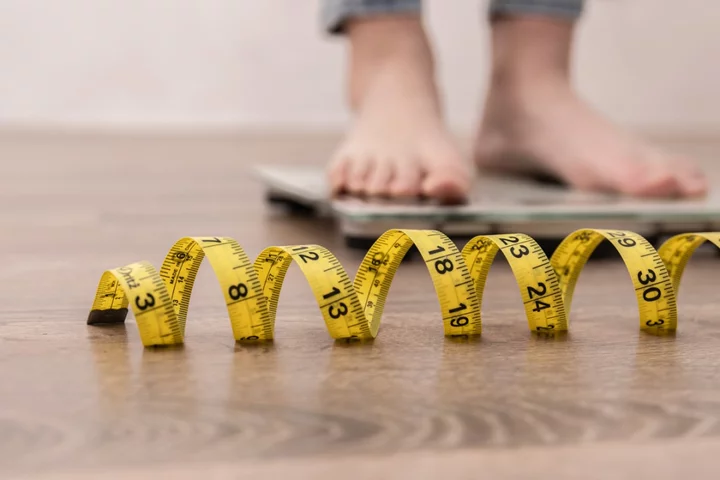
Weight loss surgery can reduce risk of cancer among women, study says
Weight loss surgery can help lower the risk of developing cancer, a study has claimed. The study, conducted by researchers at the University of Utah, also found that cancer mortality rates were significantly lower among female surgical patients compared to those who did not receive any bariatric surgery. Although population studies have previously established a positive association between body mass index and cancer rates, it has remained unclear whether the reduction in body weight leads to reduced cancer risk. Researchers say this is due to significant and sustained weight loss in large populations which may be difficult to achieve. However, because of the substantial and maintained weight loss following bariatric surgery, recent studies have reported reduced cancer rates and lower cancer mortality compared with those who haven’t had the proceedure, according to the study’s authors. “As scientists study human diseases, an element of discovery is to confirm like results from multiple studies,” said study author Ted Adams. “This research represents another important study that strongly supports the long-term benefits of weight loss surgery in the prevention of cancer.” Researchers compared cancer prevalence and death rates arranged according to obesity and non-obesity-related cancers, looking at sex, stage of the disease and procedure. The study looked at 22,000 bariatric surgery patients compared with non-surgical subjects with severe obesity between 1982 to 2019. Each patient was matched up based on age, sex, and body mass index. Scientists found that the bariatric surgery group had a 25 per cent lower risk of developing any cancers compared to the non-surgery group. Female patients had a 41 per cent lower risk for developing obesity-related cancers compared to those who did not have surgery done. Cancer risk for male bariatric surgery patients was not lower compared to non-surgery male subjects. Overall, a significant reduction in cancer risk was shown for cancers such as uterine, ovarian, colon, pre-menopausal breast and post-menopausal breast. The study also revealed death from cancer was lower by 47 per cent among female bariatric surgery patients in comparison to matched non-surgery female patients. “Important findings of this study are that bariatric surgery results in lower incidence rates of colon cancer (prior studies have not been consistent),” Dr Adam said. “Also, both pre and post-menopausal women experience reduced breast cancer incidence following bariatric surgery, which may suggest weight loss among women in either category with severe obesity may benefit from reduced breast cancer.” The study is available online in the journal Obesity. Read More Can a vegan diet help with hot flashes in menopausal women? Exercise apps could help boost healthcare workers mental health How to check if you have skin cancer: Symptoms and signs to look out for
2023-08-24 01:45

4 hacks to get teens off the sofa and get active – as study warns of heart damage
The amount of screen time teenagers get is a worry to lots of parents. And, it turns out, the health impacts of being inside and staring at a screen for long periods of time as a young person can have serious impact on physical health further down the line. According to new research, parents should limit the amount of time children spend on social media and video games, after a study found inactive teenagers are more likely to have signs of heart damage as young adults. A child may appear ‘healthy’ but, even children who have a normal weight were still at risk, the study of 766 British youngsters found, after tracking them for 13 years. Academics involved in the research, which is to be published at the ESC Congress in Amsterdam, said that this heart damage could be setting the stage for heart attacks and strokes in later life. So, how can we get teens up and out? 1. Encourage them to destress Teens may take to their screens to distract themselves from day-to-day life, watch TikToks, or aimlessly scroll – which they may see this as a form of relaxation. It might be helpful to frame exercise in the same way for stressed teens. “Young people today are facing many stress factors in their daily lives and exercise can be an important mechanism to cope and overcome such difficulties,” says Dr Triveni Joshi, consultant child and adolescent psychiatrist for Cygnet Health Care. Reiterate the benefits of exercise for their mental wellbeing too. “When you exercise, your body produces dopamine and endorphins in your brain that help you to feel good. Exercise can have a direct impact on improving mental health by reducing anxiety, depression and low mood,” she says. “Plus, exercise can give you a real sense of accomplishment and pride at having achieved a goal, thereby improving self-esteem and confidence.” Celebrate the accomplishment of just getting out and being healthy for positive reinforcement. 2. Suggest things that interest them “There is always an activity which can suit somebody,” says Joshi.”There is a range of opportunities for physical activity such as gardening, walking groups, Zumba, dancing, pilates, or swimming.” Sports like weightlifting and running are big on social media and “can improve confidence levels and tackle low self-esteem.” While being on social media may stop them from getting out, pointing towards creators who promote a healthier lifestyle may help them in the long run. Perhaps they can pair their on-screen interests and favourite creators with physical experiences. “Exercise should always be fun so often it is about finding where their interests lie and incorporating that into a healthy regime,” Joshi explains.3. Talk to them about why they don’t want to exercise There may be a reason why your teen isn’t eager to get up and about you don’t know about, and having an open discussion may help them feel more comfortable, and build a closer bond with you. “With other pressures in their lives they may feel tired and lack the motivation to get active,” Joshi says. “A lot can depend on personality type too. Introverted children may feel shy, embarrassed, or too concerned about judgements to take part in physical activity. It might not pique their interest or they may feel it is something they aren’t skilful at and therefore don’t have the motivation for fear of not being good at something.” Getting to the bottom of why they won’t exercise may help them feel more empowered to do so, particularly if you can relate to one another and take on this challenge together.4. Set a good example So much of our relationship with exercise is rooted in our childhood, so try to “encourage children to be active by setting the right example and being active yourself”, says Joshi. If you complain about exercise and are on your screen all the time, it sends the message that it’s normal. In trying to set a good example, you may find something you love to do together, like a specific yoga class, workout or weekly ParkRun. Read More Charity boss speaks out over ‘traumatic’ encounter with royal aide Ukraine war’s heaviest fight rages in east - follow live What we know so far about Naomi Campbell’s Pretty Little Thing collection Taking adult education classes may lower risk of dementia, study suggests Indiyah Polack: I didn’t want to go on Love Island because of my acne
2023-08-23 20:51
